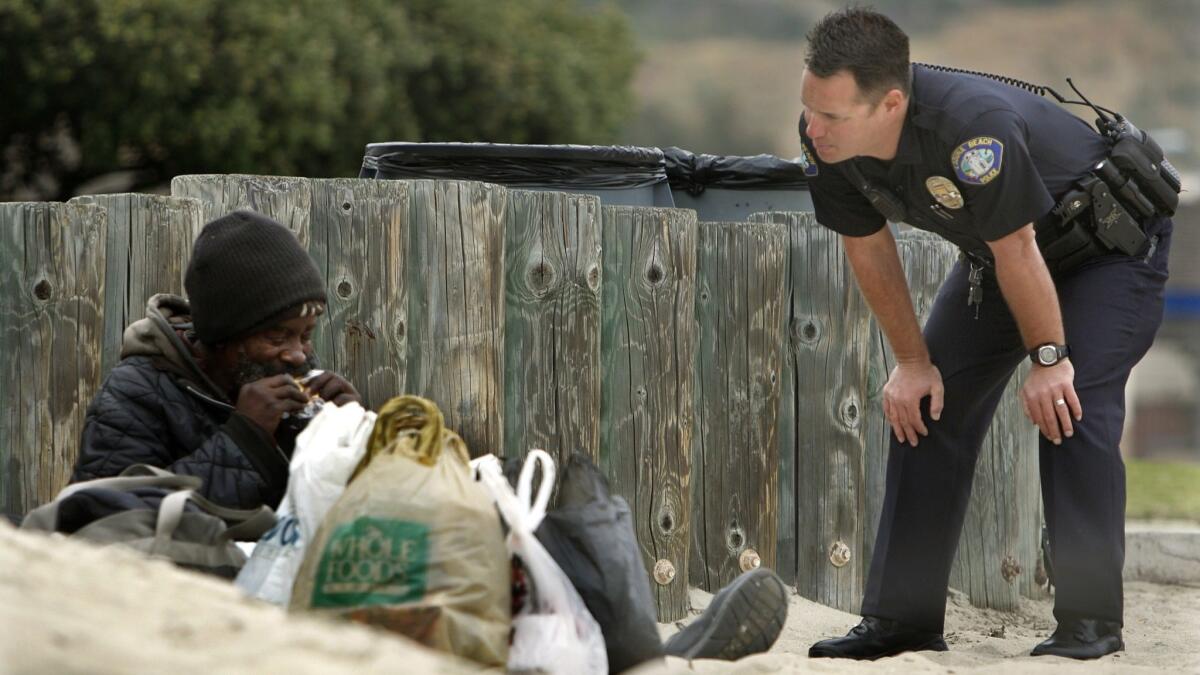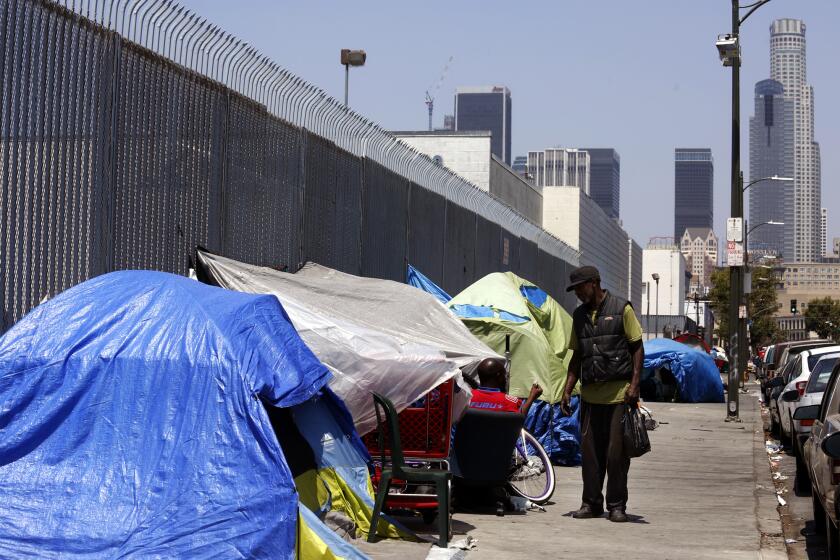Supreme Court leaves cities with one option on homelessness: More housing

- Share via
For Los Angeles and dozens of other cities across the West, all struggling to deal with a growing number of people living on the streets, Monday made clear that the only solutions to homelessness are more housing and more services.
The U.S. Supreme Court decided against hearing an appeal of the landmark case City of Boise vs. Martin, letting stand a ruling that amounts to a broad curb on police powers in California and eight other states to stop people from sleeping on public property if no other shelter is available.
In doing so, the justices took yet another tool out of the municipal toolkit for preventing people from building sprawling encampments that increasingly clog their sidewalks and streets.
Local governments had hoped the highest court in the land would clarify how to comply with the Boise ruling or carve out more authority for police to clear encampments. Instead, homeless advocates celebrated the justices’ decision as the death knell for local anti-camping laws that they say criminalize homelessness.
“I think a lot of jurisdictions were hoping that the Supreme Court would enable a much greater level of enforcement activity around the unsheltered homeless, and that won’t be the case,” said Sacramento Mayor Darrell Steinberg, who along with L.A. County Supervisor Mark Ridley-Thomas is co-chair of the governor’s task force on homelessness.
The result, some officials and homeless advocates say, is likely to be an upswing of newfound political will to build more permanent supportive housing and temporary shelters to get people off the streets.
In the past, such efforts have been slow throughout much of California, and often have been met with resistance from local government officials and neighborhood groups. But, for now, it is the only way.
“Our hope is that communities won’t be nickel-and-diming this decision and figuring out the bare minimum so they can be legally compliant,” said Eric Tars, an attorney with the National Law Center on Homelessness & Poverty, who worked on the initial Boise case and represented several of the plaintiffs involved in the challenge. “We hope they take this opportunity to alter a completely unsuccessful way of dealing with homelessness.”
Los Angeles City Atty. Mike Feuer said that getting people off the street is the priority. Still he believes that, until there is enough housing, there have to be some limits about where people can sleep.
By declining to take the case on Monday, the high court let stand a 2018 ruling from the U.S. 9th Circuit Court of Appeals, which found that it is unconstitutional to prosecute people for sleeping on public property if enough shelter or housing isn’t available as an alternative. Police can still intervene when there is criminal activity, however, such as drug use.
Dozens of cities and counties across the West, including Los Angeles, had urged the Supreme Court to hear an appeal of the Boise ruling. Many argued that the rationale for its decision was far too broad, and local governments hadn’t been given enough direction about how much housing or shelter they needed to provide to satisfy it.
Feuer, for example, has been supportive of a plan prohibiting encampments around shelters — something he predicted will probably face court challenges as a result of the high court leaving the Boise ruling standing.
“I would have preferred a clear standard by which to guide our future actions,” Feuer said. “In the absence of that, if the city puts in place the rule I want, it could well be that there’s litigation around it and that just dissipates resources we should be pouring into fixing the problem.”
Beyond that, Monday’s decision probably will not change the legal landscape much in the city of Los Angeles, where thousands of units of permanent supportive housing are under construction and a previously negotiated legal settlement barring police from clearing sidewalk encampments at night is in place.
Some cities have already changed their ordinances to comply with the Boise ruling, though, not counting on a successful appeal to the Supreme Court.
For example, the city of Novato in the San Francisco Bay Area amended its anti-camping ordinance. Also, a recently passed ordinance in Las Vegas that makes it illegal for homeless people to sleep on downtown streets will be enforced only when beds are available at shelters, a city spokesman said Monday. Nevada is covered by the 9th Circuit Court.
Orange County has been at the center of several legal fights over homeless people. The Boise ruling has been crucial in those cases, said Brooke Weitzman, an attorney with the Santa Ana-based Elder Law and Disability Rights Center who has worked on several of the cases.
In the coming months, she said, it will be important to educate cities on how best to help their homeless populations and ensure enough money goes toward housing and shelters.
“Now their lawyers are going to be saying to them, ‘Look, the thing isn’t getting reversed,’” Weitzman said of the Boise ruling. “‘This is the legal framework we’re working in. It does violate the Constitution to criminalize unavoidable behaviors like eating and sleeping outside. So what do you and the city want to do about it?’ And that will hopefully help the city to think about what is the best way to handle it. And not just how do we stop breaking the law, but how do we actually solve this problem?”
On Monday, outgoing Boise Mayor David Bieter called the Supreme Court’s decision to let the lower court’s ruling stand “disappointing.”
“We believe that the 9th Circuit’s most recent decision in this case leaves the city’s fundamental ability to protect public health and safety on its own streets very uncertain,” he said in a written statement. “Without further clarification by the courts, our most vulnerable residents — the very people this suit purports to be protecting — would be victimized by the conditions in camps that could crop up.”
Many of the Democratic candidates for president rarely mention the housing crisis. Some have released bold plans; others have so far promised little or nothing.
Homelessness was a central issue in Boise’s recent mayoral election, which unseated Bieter after 16 years in office. He had pushed for the Supreme Court to review the Boise ruling. His opponent, City Council President Lauren McLean, argued that she was against the criminalization of people who are homeless. McLean won a Dec. 3 runoff with 65% of the vote.
That Boise, a city far smaller than its coastal counterparts of Los Angeles and San Francisco, became the touchstone for homelessness was a bit of a surprise. The capital of Idaho has 1,000 to 2,000 homeless people, depending upon the source. In comparison, there are close to 59,000 homeless people in Los Angeles County.
Theane Evangelis, lead counsel for the city of Boise, said in a statement to The Times that the city is evaluating its next step as the case returns to the district court for further proceedings.
“States and counties across the 9th Circuit continue to work hard to address the complex problem of homelessness and, as an overwhelming number of amicus briefs supporting the court’s review also argued, the 9th Circuit’s decision ultimately harms the very people it purports to protect,” Evangelis said.
Steinberg, who opposed his own city’s push to have the Supreme Court hear the Boise case, has been crafting a plan with Ridley-Thomas for a possible statewide ballot measure to create a legal “right to shelter” or “right to housing.”
Cities and counties would be required to provide enough shelter beds to accommodate every homeless person living outdoors — a goal that has, so far, proved elusive in California and most Western states.
“There’s only one alternative left and that’s to actually bring people indoors with greater urgency,” Steinberg said. “And the only way that is going to happen, in my strong opinion, is if we mandate of ourselves at every level of government a legal obligation to do so.”
Times staff writer Maria La Ganga contributed to this report.
More to Read
Sign up for Essential California
The most important California stories and recommendations in your inbox every morning.
You may occasionally receive promotional content from the Los Angeles Times.












